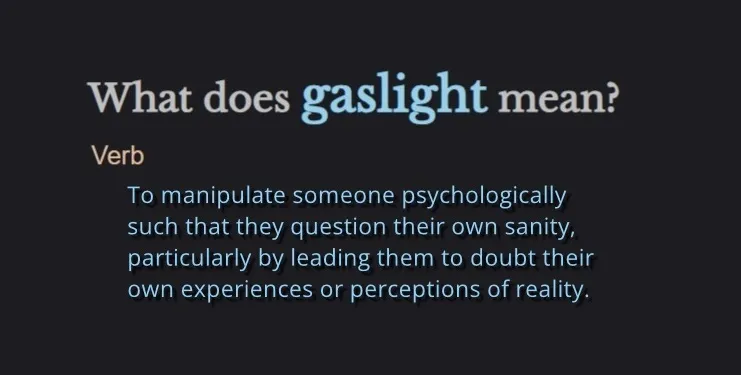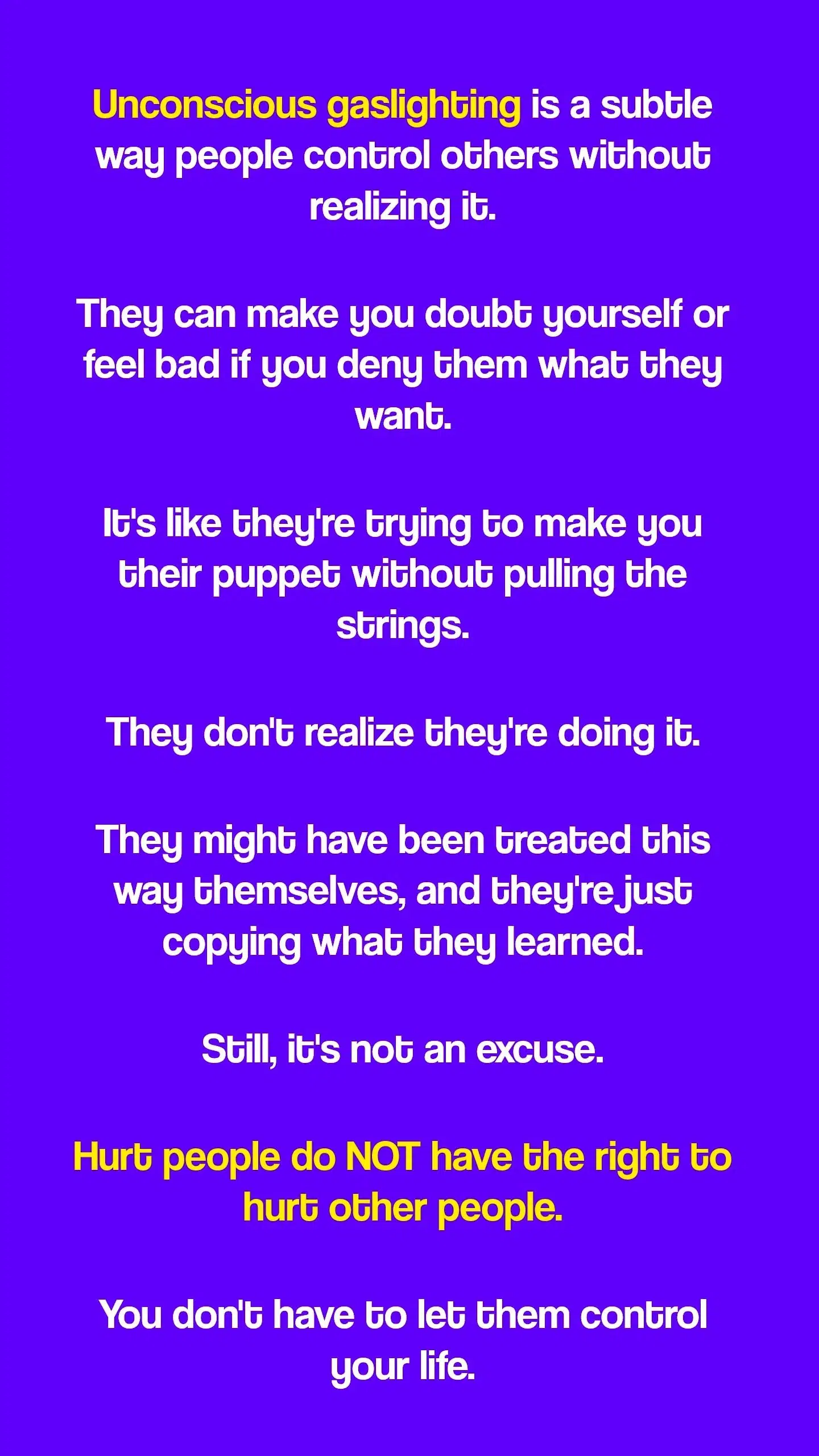Reading time: 11 minutes
You might be a victim of gaslighting, a form of psychological manipulation. But it’s hard to believe that your good and sensitive partner might be gaslighting you!
Gaslighting is manipulative storytelling. Gaslighters imprison you inside a manufactured reality, eventually making you dependent on them to interpret your world.
So, how can you recognize it and protect yourself from your “innocent” gaslighter?
What Is Unconscious Gaslighting?
Unconscious gaslighting is emotionally exploiting someone without any explicit awareness of it. It may involve fact fabrication, deliberate deception, mind games, reflexive denial, or hidden agendas. It often creates confusion and cognitive dissonance in the victim.
Simply put, unconscious gaslighting is when your gaslighter doesn’t realize he is gaslighting you.
It can leave you feeling unsure about what you think and believe, so you might ask your gaslighter if they agree, much like in classic gaslighting.

Unconscious gaslighting is the involuntary version of gaslighting. These gaslighters may be “innocent” of their acts and their impact on others.
- Unconscious gaslighting often arises when the gaslighter holds a more powerful position in a relationship.
- It can occur between family members, partners, and friends, or in situations where a person is emotionally open and vulnerable.
- These gaslighters often invalidate their victims without trying to distort their perceptions. They mostly want to be “more right” and may gaslight with the good intentions of “correcting” the person.
Once you learn to recognize it, you may choose to seek support from a therapist.
Signs of Unconscious Gaslighting In Relationships
Some signs of unconscious gaslighting are as follows:
- Your partner invalidates or belittles your opinions and emotions. When your partner invalidates or belittles your opinions and emotions, it can make you feel like your thoughts and feelings are unimportant. This may lead to withdrawal from the relationship and make you more vulnerable to further gaslighting and emotional abuse.
- You are often in a confused haze, unable to get out of overthinking loops. Feeling constantly confused and unable to break free from overthinking loops can lead to anxiety or depression. Seeking support from friends, family, or a therapist can help you regain clarity and perspective.
- You’re constantly questioning yourself and have difficulty making decisions.: Having too many self-doubts and always struggling to make decisions can leave you feeling stuck. It shows you are unable to trust your instincts and unable to move forward in your life.
- You feel unheard and are stopped from airing your opinions during conflicts.: The unconscious gaslighter may make you feel unheard by always cutting you mid-sentence and correcting you during conflicts. It can lead to a damming up of resentment, frustration, and anger.
- You feel that you can’t do anything right and doubt that you are “good enough.”: Your self-esteem and self-worth are at stake here. They make you feel like you can’t do anything right, causing you to downgrade your self-worth and self-esteem. This creates a sense of learned helplessness.
- You begin to keep silent or lie to avoid their invalidation, insults, and reality twists. You started to keep silent. You often lie to avoid the gaslighter’s invalidation, insults, and reality twists. It builds up feelings of guilt and shame.
- You hide facts from friends and family and make excuses for your partner’s behavior toward them.: To avoid criticism and judgments, you may hide facts of your abuse from friends and family. You may be making excuses for your partner’s behavior. Both can make you feel isolated and lonely.
- You ask yourself many times a day, “Am I too sensitive?”: You may start questioning yourself if you are too sensitive and making a big issue of their little irksome behaviors. You may often wonder if it’s you who cannot adjust to this relationship.
- You are constantly apologizing to your partner.: Constantly apologizing to your partner can be a sign of manipulation and control. This is a sign that you are trying hard to please them.
- You may feel like going insane.: This is the ultimate sign — feeling like you are going insane. It can be a sign of unaddressed emotional abuse and unconscious gaslighting.
If you feel someone is gaslighting you unconsciously, please note down your experiences. Then self-analyze them or ask help from a trusted person or a counselor. Seeking help is a courageous step.

Who Are The Unconscious Gaslighters
The following people tend to gaslight unconsciously:
- Close friends, non-romantic partners, and family members, especially when the victim is emotionally vulnerable.
- At work, by colleague-friends, immediate bosses, and company leaders.
- It is common in toxic relationships, both personal and professional.
- Several business and political leaders also do it.
- Partners in ‘normal’ marriages and partnerships.
“Though gaslighting is thought to be a marriage syndrome, gaslighting can … occur in many different areas such as health, politics, and romantic and social relationships.” — Akdeniz & Cıhan, 2024
There is a high likelihood of unconscious gaslighting occurring if,
- the conversation has many controversial topics,
- the issues discussed are broadly negative, and
- the gaslighter plays a vital role in our life.
Gaslighting is a deliberate strategy of impairing the reality test of another person and rendering them dependent on the gaslighter for critical cognitive functions, usually to assert control for personal gain. — Prof. Sam Vaknin
How Do People Gaslight Unconsciously
- Dismissive Language: Using phrases like “you’re overreacting” or “it’s not a big deal” when someone expresses their feelings or concerns, which invalidates the other person’s emotions.
- Minimization of Experiences: Downplaying or trivializing another’s experiences or struggles without empathizing with how it affected them.
- Self-Protecting Gaslighting: Trying to protect or inflate one’s self-image or ego, unwittingly causing others to doubt their perceptions about the gaslighter.
- Invalidating Behavior in Relationships: Constantly trying to override or suspend a partner’s experiences or feelings, without any deep intention to manipulate them.
- Organizational Gaslighting: Unknowingly causing cognitive dissonance and self-doubt in subordinates due to ego or a desire for power.
Effects of Unconscious Gaslighting On The Victim
Living with an unconscious gaslighter can be tough.
You’re constantly feeling confused, unsure, and even lonely. You even believe some of the hurtful things they say about you.
Worse, since they don’t realize they are manipulating you, they don’t see the need to change.
Psychological Effects
- Loss of Self-Esteem: Constant questioning and dismissal of feelings lead to a decline in self-worth.
- Confusion and Uncertainty: The victim struggles to trust their own perception of reality.
- Dependency: Reliance on the gaslighter for validation becomes increasingly strong.
- Loss of Confidence: The victim’s ability to make decisions and assert themselves diminishes.
- Social Isolation: As the victim doubts their sanity, they may withdraw from social interactions.
Behavioral Effects
- People-Pleasing: The victim may go to extreme lengths to avoid conflict or confrontation.
- Difficulty Setting Boundaries: A lack of self-worth makes it hard to set healthy boundaries.
- Questioning Own Sanity: The victim may start to believe they are the problem-person.
- Inability to Trust: Difficulty trusting others due to the betrayal of trust experienced.
Relationship Effects
- Strained Relationships: The victim’s confusion and emotional instability can affect relationships with others.
- Fear of Abandonment: Dependency on the gaslighter can lead to a fear of being alone.
- Difficulty Recognizing Abuse: The subtle nature of unconscious gaslighting makes it hard to identify as abuse.

How To Handle Unconscious Gaslighting
Identifying and challenging the signs of unconscious gaslighting can be difficult, since it is an intricate form of manipulation that stems from deep within the unconscious mind.
— Dr. Sandip Roy
Here are some other things you can do:
- Challenge their behavior: Let them know that their words or actions are hurtful. You don’t have to be rude or aggressive to be clear about how you feel.
- Trust yourself: Believe in your own perception of reality. Trust your judgment, intuition, and instincts. Don’t let someone else’s opinion control you.
- Build a support system: Seek emotional support from friends, family, or professional counselors. Share with them what’s happening. They can offer validation and coping strategies.
- Prioritize self-care: Focus on things you enjoy and that make you feel good. Your mental well-being comes first.
- Set boundaries: Define clear limits for acceptable behavior in the relationship. Communicate and enforce these boundaries clearly and consistently to protect your emotional health.
- Question everything: Challenge the gaslighter’s claims. Ask open-ended questions until you find the truth. Show evidence to support your statements.
- Unmask the manipulation: Point out their deceptive ways and gaslighting tactics, and ask them to stop.
- Maintain objectivity: Observe the situation without emotional reactivity. Not just their words, but also notice their body language inconsistencies. Don’t say mean things — it can trigger them.
- Take control: Decide to regain your sense of agency. Be clear and assertive about your experience. Don’t let them enter the denial mode. Tell them if they don’t accept responsibility, you might break up with them. Stay focused on what you can control.
- Seek professional help: If you’re struggling to handle it by yourself, talk to a counselor to learn healthy coping mechanisms.
Don’t Enable The Gaslighter
Gaslighters avoid taking responsibility, offer fake apologies, and blame others — to avoid punishment or insult. See the situation from their point, but don’t let it be an excuse for their misbehavior.
- Some gaslighters may have been treated this way themselves.
- They may have had gaslighting parents, teachers, or controlling relationships.
- They might be acting out past hurts or control issues, copying what they learned.
- Being gaslighted when vulnerable is not an excuse to gaslight others; so don’t be their enabler.

Hurt people are not entitled to hurt other people.
Unconscious Gaslighting vs. Unintentional Gaslighting
Unconscious gaslighting is different from unintentional gaslighting.
| Aspect | Unconscious Gaslighting | Unintentional Gaslighting |
|---|---|---|
| Definition | Occurs when the gaslighter is unaware they are gaslighting | Occurs when the gaslighter’s actions unintentionally gaslight |
| Motivation | Rooted in the gaslighter’s own psychological defenses or issues | Stem from a desire to help, protect, or avoid conflict |
| Examples | Downplaying feelings because of discomfort with emotions | Telling someone they are overreacting to calm them down |
| Awareness | No conscious intention to deceive or control | Aware of their actions but not the gaslighting effect |
| Key Differences | Intent and Awareness: Unaware of behavior and effects | Intent and Awareness: Aware of actions but not the harmful impact |
| Impact | Driven by internal conflicts and needs | Stems from misguided attempts to help or protect |
| Recognition & Correction | May be more challenging due to lack of awareness | Easier to address once the gaslighter is aware of the impact |
Why Do You Accept Unconscious Gaslighting
We often let our close ones gaslight us, letting go of their many “little” mistakes because we love them and don’t want to lose them.
Some other reasons to be a gaslighted victim are:
- Codependency: You may have been co-dependent with a previous partner, and have learned to normalize gaslighting. Over time, you become increasingly dependent on this new partner, who continues to gaslight you. Codependency is when two people get so attached that they cannot decide or act on their own.
- Shame or Guilt. You might be feeling overwhelmed by shame and guilt, making it hard for you to question their gaslighting behavior. You keep silent because you know they will shame you more for blaming them.
- Past Trauma. You may have been victim-shamed and asked to self-blame after a past traumatic event — sexual, physical, or verbal abuse. The residual fear may keep you from challenging them.
- Need For Approval. You might be overly self-sacrificing to keep the relationship going. This could drive a high need for approval (HNA), feeling rejected and unworthy when the gaslighter does not approve of your behavior.
FAQs
Are emotionally vulnerable people more prone to gaslighting?
Emotionally vulnerable people are more able or willing to identify, accept, and express difficult or painful emotions, such as shame, dejection, jealousy, and insecurity. These people are more likely to be gaslighted, as they cannot easily detect subtle manipulation. Even when they do, cannot easily challenge the perpetrator.
What is shadow gaslighting?
Shadow gaslighting is using “indirect” tactics to manipulate and discredit a target.
The shadow gaslighter tries to plant doubts about what’s going on in someone else’s life, by convincing them that what they think is incorrect.
It often occurs in a relationship in which one person is in a position of power over the other.
What are some gaslighting strategies?
Gaslighting strategies include withholding, countering, blocking, diverting, trivializing, and fake-forgetting.
Final Words
Unconscious gaslighters are not aware of their acts. They are otherwise good people in the relationship. So, victims may not find a reason to break away.
This creates a vicious cycle of gaslighting—accusation—denial—hesitation (to break up)—more gaslighting.
There is a related concept called Unintentional Gaslighting.
√ Also Read: 20 Gaslighting Phrases (That Narcissists & Manipulators Use)
√ Please spread the word if you found this helpful.
• Our Story!
